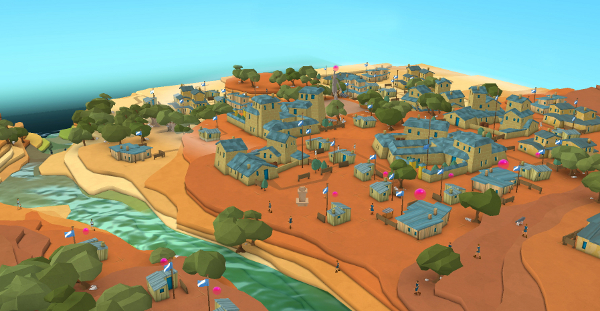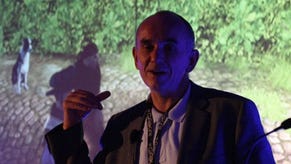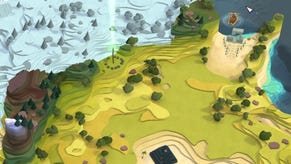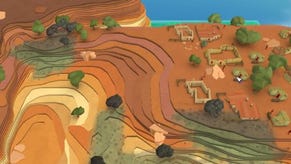Molyneux On Religion, Godus' "Crazy" Single-Player
Getting To Know God(us), Pt 2
Peter Molyneux is up to his old tricks again, for better or worse. He's gone gaga for Godus, and he wants the world to hear all about it. And who knows? Maybe this time - finally, after years of squandering his legendary status on unfulfilled promises and mediocre games - he's onto something. Godus certainly sounds fascinating, with Molyneux describing it as a massively polytheistic EVE-Online-inspired social experiment that seems destined for player-driven chaos. But there are still far too many question marks, with the Curiosity-born god of gods and an offline single-player story being the biggest. So I took my promise-weary, cynical heart to Molyneux, and here's how he replied.
RPS: So how does religion work in multiplayer? You say it's really different, but can you explain it at all?
Molyneux: The only thing I’ve said about clans is that to challenge Bryan, the god of gods, you have to form a religion. That religion is like a clan. You are forming a collection of people in the Godus world, and if your religion does well – and I haven’t defined what “well” means – then your religion can challenge Bryan.
That is very interesting, because you have to send one person from your clan to challenge Bryan. You all know that he has to leave your clan if he wins. You all know. He’s going to be the new god of gods. How he interacts with you after you’ve worked so hard to put him on that pedestal is going to be interesting. But there’s some very interesting stuff. For me, I think a lot of the time clans don’t do enough. I should feel a benefit from being in a clan. It should be more than just chatting. It should be about tangible benefits from being in a clan.
RPS: During your PAX panel you mentioned that god of gods' cut of Godus' profits would be "significant". Can you give an actual percentage?
Molyneux: It’s probably best if I don’t give an exact percentage, but it’s got to be financially worthwhile, because it’s got to be something that you aspire to do. The first game that I did, I think I got less than five percent royalties from it. I’m not saying he has five percent royalties. But it’s more than a percent. We can vary it as we see fit. But it’s not capped at all. Even though there was a debate about how it should be capped.
There’s one thing that I didn’t say during my keynote which is really significant, and that is that we’re releasing the Steam Early Access version on Friday the 13th of September. At the end of October, we release the iPad version, and two weeks later we release the Android version. That means it’s not just going to be PC and Mac. He gets all that money from all those versions. I don’t know how many it’s going to sell. It’s 19 bucks. 19 bucks, if it sells 100,000, it’s a nice amount of money. If it sells a lot more, who knows?
RPS: You’ve been emphasizing the multiplayer aspect of Godus. Is there still going to be a single-player campaign?
Molyneux: Yes. There’s a single-player story. Again, this is something I haven’t really talked about, because it’s not something that’s really going to be… We’re not going too far down the storyline in the beta or the Friday the 13th build. But it’s a completely different story to any story that you’ve played in a game. It’s tempting to make a story about Zeus on Mount Olympus, but that doesn’t… It doesn’t really add to the game. I think this story is very… It’s going to be interesting. It’s a bit crazy. It’s a crazy story.
RPS: How so?
Molyneux: Because it’s an emotional story. I want to create a story that is has emotional elements to it, like in Fable. How do you do that in a god game?
RPS: You add a dog.
Molyneux: How do you have a dog?
RPS: You play as a dog who’s also God.
Molyneux: [laughs] There is a cat in the story. But I’m not going to give you any more clues than that. It’s very crazy, the story. To give you an example, we consulted with this one scriptwriter who worked on this famous soap opera in the United Kingdom called Coronation Street, which has been running for 40 years. Even me, at my most optimistic… I was worried that it might not work.
There were quite a few things that I didn’t cover. One of the most charming things - I think the most charming thing in the game is the most silly, stupid thing. One of the cards you can win [and acquire abilities from] is you. So if you play in a multiplayer game against me and you win card 16, it’s actually me. In your world, there will be a little character, and it will have my name at the top of the character, Peter Molyneux.
That character is fully attached to my social feed, so all my tweets will come up at that name. What it actually means, stupidly, is that you can’t help [but deal with some fallout]. I’m sure someone is going to use the finger of Godus to squish me. But I’ve got my wife and my son in the game. My wife tweets and it comes up in the world. She’s on a mountaintop in my world. I just love her. She’s got this lovely garden. She goes out and farms. It’s just charming. It’s a stupid feature. It’s just a piece of text.
But you end up, bizarrely – and this is what this demo didn’t get across – you end up caring for your little people, because they love you so much. You just feel good. They’re your friends. They’re in this little village together and they’ve all got their social feeds coming up.
RPS: So that’s going to be completely offline?
Molyneux: Who dares to say their game is always online these days? I’m sure that if I said that on stage today, this red dot would appear on my forehead and I’d be sniped to death. So just like in Curiosity, you didn’t have to be online all the time to play Curiosity. You don’t have to be online all the time to play Godus. I don’t think that’s a feature that you will care about, playing in the offline mode. Because all these social feeds go out the window. You don’t see the other gods on this planet. We can only buffer so many of the changes in your world before we need to upload it to the server. Otherwise you’re going to be out of sync with the game. But we still allow you to play offline.
RPS: Do you have to check in after a certain amount of time?
Molyneux: No. It’s just like Curiosity. We will save as much as we can about your world, and if you go online, you’ll be able to automatically update. If you played Curiosity, you could be tapping, and you wouldn’t even notice you were in airplane mode. That’s some of the technology we had to get right.
RPS: That’s also another big concern. What if you are right next to somebody, and then they just stop playing? Maybe you never even meet, you just see them, and then you realize they stopped building you. You just have this dead town next to you.
Molyneux: That leaves un-cared-for and unloved people, isn’t it? These little people, they’re not going to just die. They’re not going to sit there and wait. They’re going to be patient, just like we are. We’re patient with God. But we need his love sometimes. They’ll wait for a certain amount of time, but eventually they’ll consider themselves unruled by a god, and they’ll leave and go somewhere else.
RPS: Can you just absorb them into your fold?
Molyneux: It’s the little people’s choice, the followers’ choice, whose religion they’re going to be a part of that’s close to them. I’ll be honest with you. There was a game that I played which solved an awful lot of these problems. It was a game called Tribal Wars. Tribal Wars, you founded these villages and they were all connected. I played Tribal Wars a hell of a lot. And it was exactly that thing. If a place was unplayed for a considerable amount of time, it could be consumed by the neighboring populations.
[PR motions that we're out of time, pulls a lever to open up a trapdoor beneath my seat]
RPS: Thank you for your tiiiiiiiiiiiiiiiiiiiiiiiiiiiiime.
You can read part one of the interview here.













